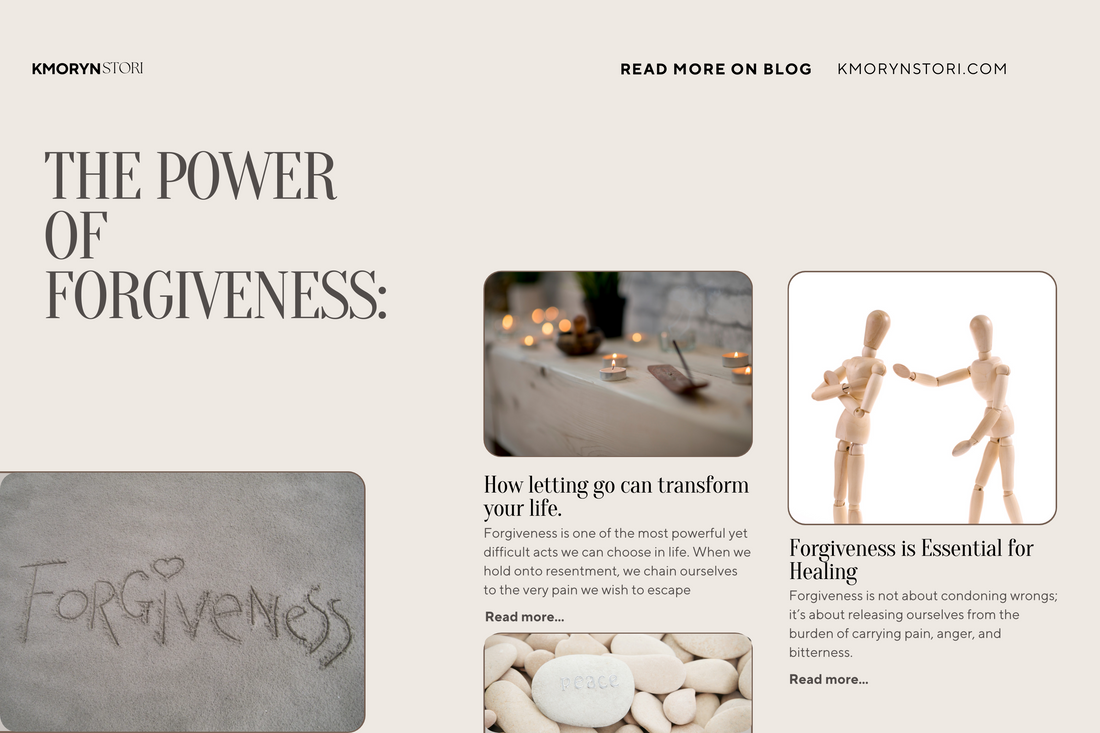
The Power of Forgiveness: How Letting Go Can Transform Your Life
Share

Forgiveness is one of the most powerful yet difficult acts we can choose in life. When we hold onto resentment, we chain ourselves to the very pain we wish to escape. But when we let go—when we truly forgive—we free ourselves, opening the door to healing, peace, and even personal transformation.
Why Forgiveness is Essential for Healing

Many of us struggle with forgiveness because we equate it with excusing the harm done to us. However, forgiveness is not about condoning wrongs; it’s about releasing ourselves from the burden of carrying pain, anger, and bitterness.
Unforgiveness is like drinking poison and expecting the other person to suffer. The more we dwell on past hurts, the more we allow them to control our emotions, relationships, and overall well-being. True forgiveness is a gift we give ourselves, allowing us to break free from the grip of past wounds.
The Cost of Holding Onto Resentment

Refusing to forgive has deeper consequences than we often realize. It affects us mentally, emotionally, and even physically:
• Emotional Toll: Holding onto resentment keeps us in a cycle of pain, preventing us from fully experiencing joy and peace.
• Mental Strain: Constantly replaying past hurts can lead to anxiety, stress, and depression.
• Physical Impact: Studies show that chronic anger and resentment can contribute to high blood pressure, weakened immune function, and other health issues.
• Relational Barriers: When we struggle to forgive, it often affects our ability to trust and form meaningful relationships.
How Letting Go Can Transform Your Life
1. Freedom from Emotional Bondage
When you forgive, you release yourself from the emotional weight of past pain. No longer tethered to bitterness, you make space for joy, love, and personal growth.
2. Improved Mental and Physical Well-Being
Studies have shown that forgiveness reduces stress, lowers blood pressure, and contributes to better sleep. A forgiving heart is often a healthier heart.
3. Restored Relationships (When Appropriate)
Forgiveness can mend broken relationships—whether it’s with family, friends, or even yourself. While reconciliation isn’t always necessary, forgiveness allows for emotional closure.
4. Spiritual Growth and Inner Peace
Many faiths, including Christianity, emphasize the importance of forgiveness. Matthew 6:14 reminds us: “For if you forgive other people when they sin against you, your heavenly Father will also forgive you.”Embracing forgiveness strengthens our spiritual walk and deepens our inner peace.
5. Reclaiming Your Power
When you forgive, you take back control of your emotions and your future. Instead of allowing pain to dictate your choices, you choose healing and growth.
Steps to Cultivating Forgiveness

1. Acknowledge Your Pain– Be honest about how you’ve been hurt. Suppressing pain only strengthens its hold on you.
2. Shift Your Perspective– Try to see the situation from a broader view. Often, those who hurt us are also struggling in ways we may not understand.
3. Choose to Forgive– Forgiveness is an intentional act. Even if you don’t feel ready, making the decision to let go is the first step.
4. Release the Need for Revenge– Holding onto resentment keeps you bound to the past. Let go of the need for justice and trust that healing is more valuable than revenge.
5. Practice Self-Forgiveness– Sometimes, the hardest person to forgive is yourself. Acknowledge your mistakes, learn from them, and move forward with grace.
6. Seek Spiritual or Emotional Support– Prayer, counseling, or talking with a trusted friend can help you navigate the path to forgiveness.
Final Thoughts
Forgiveness is not always easy, but it is always worth it. By letting go of past pain, you create space for healing, joy, and new beginnings. You may not be able to change the past, but you do have the power to shape your future—starting with the choice to forgive.
Are you ready to set yourself free? The journey begins with one simple yet life-changing decision: to let go.
